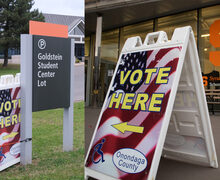Chancellor’s remarks on free speech spark mixed reactions
Corey Henry, Emily McNeil | The Daily Orange
Students, faculty discuss what free speech mean on campus heading into the 2020 elections
Syracuse University Chancellor Kent Syverud has reiterated that the university should protect the right to free speech, even if it allows for uncomfortable discourse.
For SU to be a “real university,” students must be exposed to a “true range of views,” Syverud said at last month’s University Senate meeting. Students should be able to say things that make others “profoundly uncomfortable” so they can better learn from others. He also emphasized the importance of the university not silencing professors with controversial views.
“That exposure is very difficult to achieve at a university or in a department where the faculty are too ideologically uniform,” Syverud said. “In hiring new faculty, I believe our university needs to be more attentive to this issue, and more concerned.”
Some saw Syverud’s statementas a simple defense of free speech on campus. Others wondered what it meant.
Professor Roy Gutterman, a USen senator and the director of the Tully Center for Free Speech, saw the statement as a continuation of Syverud’s commitment to defending free speech. Jackie Orr, an associate professor of sociology, speculated that it was in relation to SU’s recruitment of veteran students and programs. Several were alarmed the chancellor implied SU’s faculty were “ideologically uniform.”
“I’m not sure what that means in terms of the administration’s policy in the future, and you know, he didn’t really tell us,” said Professor Mark Rupert, a university senator and professor of political science. “He just sort of said ‘I’m thinking about this.’”
At least three faculty members emailed Syverud after the meeting, including Rupert. None have received a response as of Oct. 1.
At the meeting, Rupert asked the chancellor if he was suggesting hiring conservative scholars through affirmative action. SU is in the mid of hiring 200 faculty over the course of five years as part of its cluster and signature hires initiatives.
Syverud replied no to Rupert’s question, adding that the university has to ensure it’s seeking a full range of perspectives. If not, the space for free speech may shrink, he said.
Rupert worried that these remarks pointed to self-censorship.
“My own approach to these challenges starts from the notion that my most basic commitment to my students is honesty,” Rupert said in his email to Syverud. “I must tell them what I believe to be true about our political and social lives.”
The USen meeting was the first time Syverud mentioned free speech in relation to hires. But his speech echoed statements he has made since coming into office in 2014 that promoted open discussions and a wide range of views across campus.
About two months before the 2016 presidential election, Syverud revised the university’s policies relating to free speech by protecting peaceful debate. A year and a half later, he said SU would “continue to vigorously protect free speech” after President Donald Trump’s issued an executive order threatening to pull certain funding from schools who don’t. He resisted calls to fire professor Dana Cloud, whose controversial tweet about anti-Sharia law protesters caused backlash on social media.
We almost have the fascists in on the run. Syracuse people come down to the federal building to finish them off.
— Dana Cloud (@danaleecloud) June 10, 2017
Sarah Scalese, senior associate vice president for university communications, referred to the chancellor’s remarks at USen to describe his views on free speech.
As election season sparks increased debate on campus, SU’s Student Association is attempting to take a bipartisan role on campus. SA President Mackenzie Mertikas said the organization’s role is as a student advocacy group rather than a political organization.
“That being said, we don’t want to ever be caught in a situation where we could have spoken up and advocated for students and didn’t,” said SA Vice President Sameeha Saied.
Leaders from both SU’s College Democrats and Republicans have said they feel comfortable with their clubs inviting speakers on campus and aren’t worried about the university controlling who they bring in for speakers. The two clubs are preparing to debate each other in November.
Rody Conway, chairman of SU College Republicans, noted that the political ideologies of most professors on campus are “center-left.” However, he said ideological uniformity is not a problem on campus for himself.
Conway walks around campus with a Republican pin on his lapel on Wednesdays, when the club meets. He said he’s had “no problem” wearing it on campus, except for the occasional dirty look, which he said he expects.
While SU Democrats preps for its debate with College Republicans, Emma Peca, communications director for the club, wondered at the USenmeeting what would happen if free speech on campus turned to hate speech.
Peca, also a university senator, later asked the chancellor that question. Syverud said he didn’t know, and that it was a long, difficult process. This was an honest answer, she said.
“I wasn’t really expecting a concrete answer because that is a very hard question to ask,” Peca said.
Both Peca and Conway said the university does well with upholding free speech on campus. The Foundation for Individual Rights in Education, an organization meant to promote free speech and individual liberties on campus, ranked SU as one of the top 10 worst schools for free speech in the country.
In an emailed statement to The Daily Orange, a FIRE spokesperson said SU has “flagrantly violated its students’ free speech rights.”
The spokesperson referenced the 2018 expulsion of the Theta Tau brothers as a violation of free speech. They also referenced the Department of Public Safety’s patrolling of campus for offensive Halloween costumes in 2010, which occurred when former Chancellor Nancy Cantor was in office.
More recently, Young Americans for Freedom, a youth conservative group aimed at rigorously upholding the constitution and imposing “traditional American values,” was approved as a registered student organization on campus.
The university initially rejected YAF in February for its lack of a faculty advisor and its requirement that members agree to the “superiority” of the U.S. constitution. SU deemed that requirement deemed exclusionary of international and other students, according to the rejection email. In September, YAF was accepted after finding a faculty adviser. It is unclear whether their policy regarding the constitution changed.
YAF chapter president Justine Murray and Conway both said they’re attempting to bring Ben Shapiro, a conservative political commentator, to campus later this year. They’re currently in conversation with SU administrators about this, they said.
A local ACLU chapter was also approved as an RSO on campus. Yusuf Abdul-Qadir, NYCLU’s director for central New York, did not respond to an emailed request for comment. Neither did Jalen Nash, one of the club’s founding members.
Gutterman, who was a student at SU about three decades ago, said protests and student organizations have reflected the politics of the time.
“I’m pleased that the chancellor’s taking a public stance on supporting free speech,” said Gutterman. “If we can’t have free speech at a university, I don’t know where else you’re going to have it.”
Published on October 6, 2019 at 10:44 pm
Contact Gabe: gkstern@syr.edu | @gabestern326





